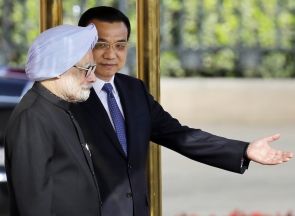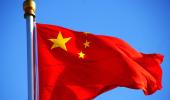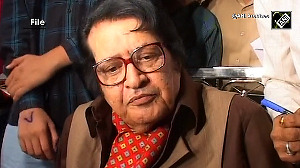
Sheela Bhatt, who is travelling with Prime Minister Manmohan Singh on his two-nation visit, analyses the outcome of crucial talks between the PM and his Chinese counterpart in Beijing.
There were two major outcomes from the highest-level talks between India and China on Wednesday in Beijing. A better and deeper understanding on border defence, and issues related to trans-border rivers will, hopefully, be better managed.
An agreement to increase co-operation at the borders, which are not yet settled, has been reached. Issues related to the Sutlej and Brahmaputra rivers are now taken up at the highest levels. Some kind of a firm beginning is made finally to co-operate amicably on the trans-border rivers issue. Better data will be available at the hands of Indian experts after the agreement on rivers which will go a long way in eventually taking up contentious issues about the actual sharing of water.
Through the Border Defence Co-operation Agreement, a political message has been given from Beijing to the respective militaries, on the ground around the borders, that they should exercise maximum self-restraint when misunderstandings or a crisis erupts along the Line of Actual Control.
The stapled visa issue was taken up by Prime Minister Manmohan Singh at the delegation-level talks. The issue is under discussion and the Indian side has taken a firm stance, as of now. Foreign Secretary Sujata Singh said after the talks, “This is the issue on the table now and we will take it further.”
On the eve of Dr Singh’s important visit, India put off signing of the new visa agreement between the two countries. A “jerk” was given to the Chinese side in protest over the stapled visas given to two sports-persons from Arunachal Pradesh. Sources privy to the restricted meeting of both prime ministers and also the delegation-level talks said that India put across it concerns over the stapled visa issue ‘strongly’.
However, since Indian businessmen are looking for a liberal visa policy that would enable them to travel to and from China with ease, India is likely to yield soon on the new visa agreement.
Also, the issue of terrorism emanating from Pakistan and China’s activity in Pakistan Occupied Kashmir was discussed between the two sides as well. On the issue of terrorism emanating from Pakistan, Foreign Secretary Sujata Singh said, “Without going into details I assure you that the issue did come up. We put it squarely on the table.”
However, the border agreement will remain the centerpiece of Dr Singh’s visit.
There is a new arrangement for militaries on both sides where they are told, “they shall not follow or tail patrols of the other side in areas where there is no common understanding of the Line of Actual Control in the India-China border areas.”
Indian ambassador S Jaishankar said, “If you look at the agreement of ‘not tailing’ our patrol, that makes for a safer situation at the border.” He added, “Now the highest levels of government are telling you, please exercise maximum self- restraint. I would imagine the respective armies would exercise maximum self-restraint.”
In fact the BDCA was termed as “operational instruction to the forces on the ground” by Jaishankar while speaking to the Indian media after the talks.
He said when instructions are given from the top it does improve the behaviour and change the mindset of the respective armies when occasional encounters occur on the borders.
While talking about the chemistry between two prime ministers, the officer present at the delegational level talks observed that it can be said that India has established well its relations with the new leadership of China. The personal chemistry between Dr Manmohan Singh and Li Keqiang satisfied both sides. The restricted level talks were scheduled for 30 minutes or so but lasted for around an hour, which is taken as a positive sign by both the countries.
Similarly, in spite of the assumption that this is Dr Singh’s last official visit to China, he was shown special respect by the Chinese leaders. Not only did former premier Wen Jiabao request Dr Singh to accept the offer of a special lunch meeting, even Premier Li accompanied Dr Singh to an afternoon walk in the Forbidden City. In Asia such gestures hold special significance and are accepted with grace, said an Indian diplomat.
On the issue of trade no substantial decisions were declared. The adverse trade balance was discussed in the high-level talks. Premier Li has asked for suggestions from India to reduce the trade imbalance. Indian pharma companies have been sounded out to come forward, but so far the Indian side has not come up with ideas, said an Indian diplomat.
The Indian side said a Chinese team is in India to shortlist the space to establish an industrial cluster to pour in their investment and start manufacturing for the local market and for exports. That would be the big ticket event in the coming months.
Image: China's Premier Li Keqiang welcomes Prime Minister Manmohan Singh before the ceremony at the Great Hall of the People in Beijing October 23.
Photograph: Jason Lee/Reuters











 © 2025
© 2025